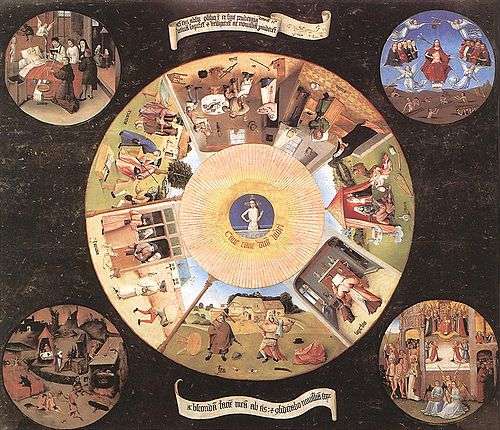Seven virtues
In the Catholic catechism, the seven Christian virtues or heavenly virtues refers to the union of two sets of virtues: from ancient Greek philosophy, are prudence, justice, temperance (meaning restriction or restraint), and courage (or fortitude); and the three theological virtues, from the letters of Saint Paul of Tarsus, are faith, hope, and charity (or love). These were adopted by the Church Fathers as the seven virtues.
A concept of seven deadly sins provides didactic contrast.
History
The first virtues were identified by the Greek philosophers Aristotle and Plato, who regarded temperance, wisdom, justice, and courage as the four most desirable character traits. After the New Testament was written, these four virtues became known as the cardinal virtues, while faith, hope, and charity were referred to as the theological virtues. But Stalker, in his book The Seven Cardinal Virtues, says, "It is of distinct advantage to be reminded that the Christian character has a natural foundation... but certainly the latter are cardinal also--that is, hinge virtues; and it is convenient to have a single adjective for designating the whole seven".[1] However, such a perspective runs counter to the traditional understanding of the differences in the natures of Cardinal and Theological virtues, as the latter are not fully accessible to humans in their natural state without assistance from God. "All virtues have as their final scope to dispose man to acts conducive to his true happiness. The happiness, however, of which man is capable is twofold, namely, natural, which is attainable by man's natural powers, and supernatural, which exceeds the capacity of unaided human nature. Since, therefore, merely natural principles of human action are inadequate to a supernatural end, it is necessary that man be endowed with supernatural powers to enable him to attain his final destiny. Now these supernatural principles are nothing else than the theological virtues."[2]
Seven heavenly virtues
A list of seven heavenly virtues, to oppose the seven deadly sins, appeared later in an epic poem entitled Psychomachia, or Battle/Contest of the Soul. Written by Aurelius Clemens Prudentius, a Christian governor who died around 410 A.D., it entails the battle between good virtues and evil vices. The enormous popularity of this work in the Middle Ages helped to spread the concept of holy virtue throughout Europe. The virtues are identified as chastity, temperance, charity, diligence, patience, kindness, and humility. Practicing them is said to protect one against temptation from the seven deadly sins.
| Virtue | Latin | Gloss | (Sin) | (Latin) | Virtue's Meaning |
|---|---|---|---|---|---|
| Chastity | Castitas | Purity, knowledge, honesty, wisdom | Lust | Luxuria |
|
| Temperance | Temperantia | Humanity, justice, honour, abstinence | Gluttony | Gula |
|
| Charity | Caritas | Will, benevolence, generosity, sacrifice | Greed | Avaritia |
|
| Diligence | Industria | Persistence, fortitude, effort, ethics, rectitude | Sloth | Acedia |
|
| Patience | Patientia | Forgiveness, mercy, sufferance | Wrath | Ira |
|
| Kindness | Benevolentia | Satisfaction, loyalty, compassion, integrity | Envy | Invidia |
|
| Humility | Humilitas | Bravery, modesty, reverence, altruism | Pride | Superbia |
|
See also
References
- ↑ The Seven Cardinal Virtues, by James Stalker (1902) - p. 10
- ↑ http://www.newadvent.org/cathen/15472a.htm
- ↑ Hoopes, Tom. "Seven Passion Sins and Virtues". National Catholic Register. Retrieved 17 May 2013.
- ↑ Robert Grosseteste II Dicta
External links
| Wikimedia Commons has media related to The Seven Virtues. |
